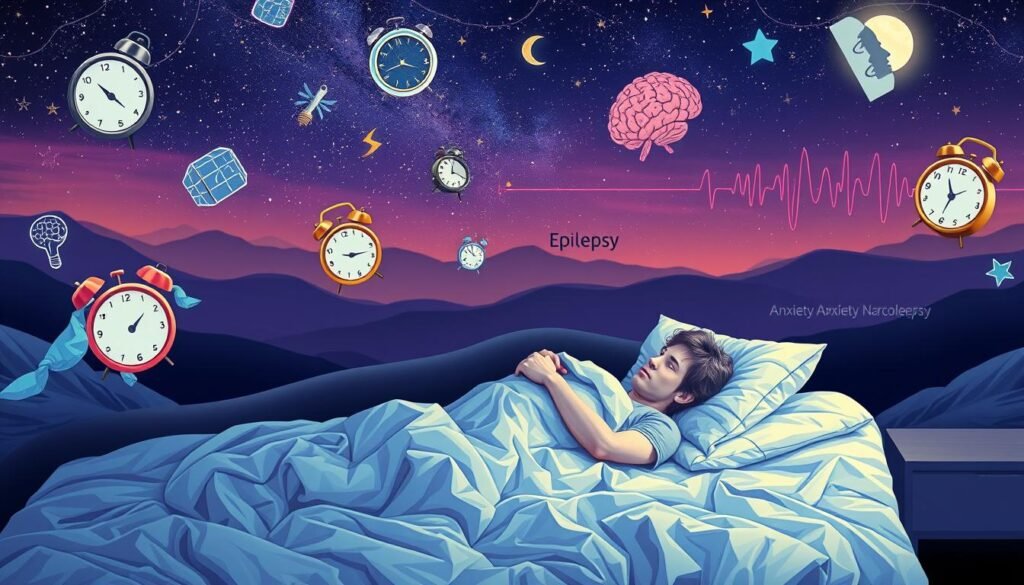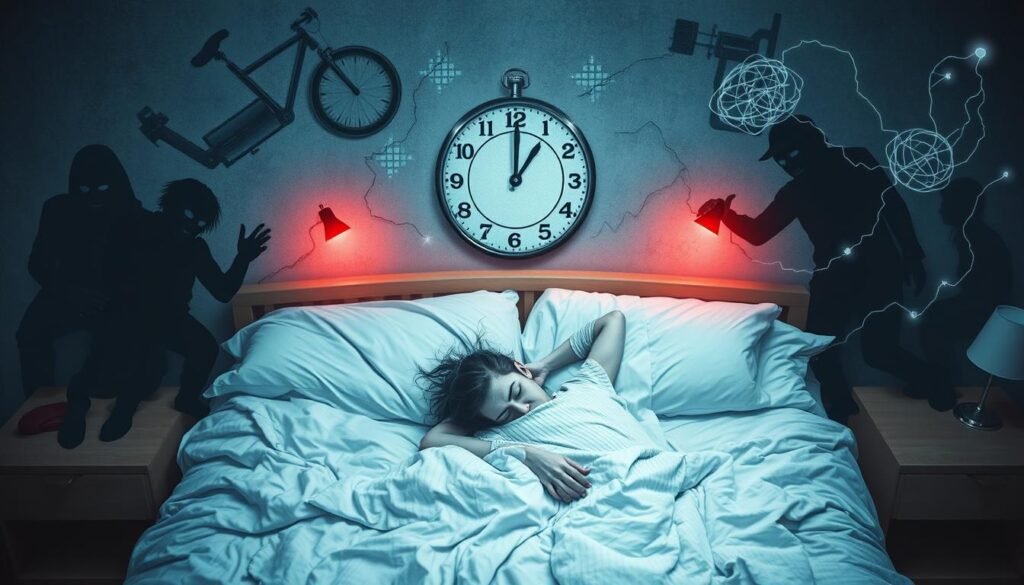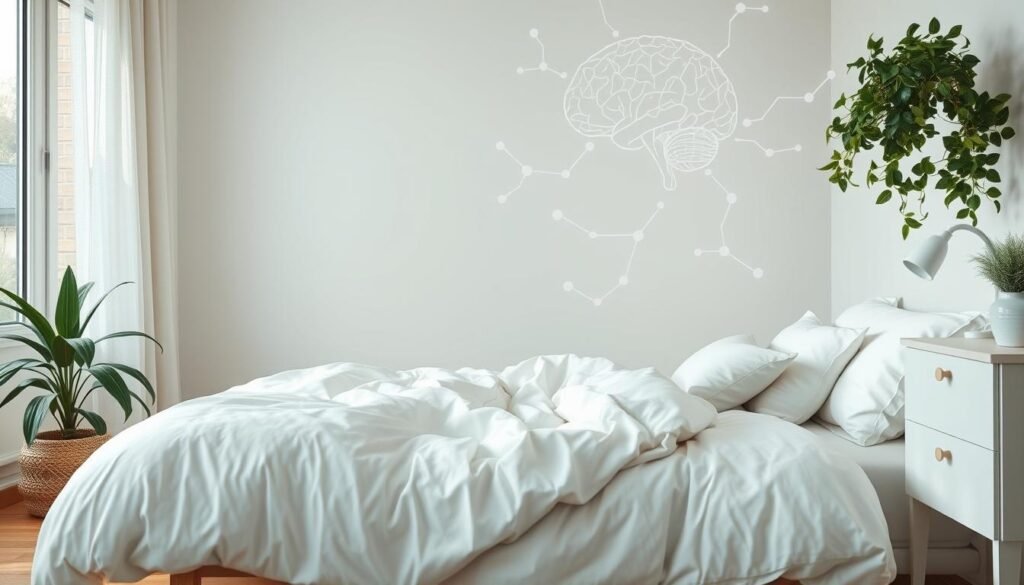Did you know over 5.5 million people visit family doctors yearly for insomnia? This high number shows the urgent need to manage sleep problems well, especially in those with epilepsy. The connection between insomnia and epilepsy deeply affects many people’s health and life quality. It’s crucial to find the right treatment to improve sleep and decrease seizures.
Insomnia often happens alongside epilepsy, posing special challenges for doctors. It’s very important to address sleep problems to help patients get better. Looking into how to treat both epilepsy and insomnia is key to helping those affected, underlining the importance of good insomnia care in epilepsy.
Key Takeaways
- Management of insomnia is critical for overall health in epilepsy patients.
- The prevalence of insomnia among individuals with epilepsy can complicate their condition.
- Effective treatment plans for insomnia can help reduce seizure frequency.
- A variety of treatment options are available, including pharmacological and alternative therapies.
- Healthcare providers must prioritize sleep quality in epilepsy management to improve patient outcomes.
The Complex Relationship Between Sleep and Epilepsy
The link between sleep disorders in epilepsy and epilepsy itself needs close examination. Studies show that poor sleep can make seizures more frequent. This creates a tough cycle for those dealing with both. How sleep interacts with seizures is complex. While NREM sleep might make seizures more likely, REM sleep seems to offer some protection. This situation impacts seizure control and overall health.
People with epilepsy often face epilepsy related sleep disturbances more than others. They struggle with issues like insomnia, feeling very sleepy during the day, and sleep that doesn’t follow a regular pattern. All of these problems can make life harder. Interestingly, about 20% of those with epilepsy only have seizures while asleep. The risk and type of sleep disturbances vary with factors like age, gender, and other health conditions.
Treating these sleep disorders well can help control seizures better and boost overall health. Depression can make everything tougher, affecting over a third of those with epilepsy. This shows why it’s important to tackle both epilepsy and related issues together.
Understanding Sleep Disorders in Epilepsy
People with epilepsy often struggle with sleep disorders like insomnia, obstructive sleep apnea (OSA), and restless legs syndrome (RLS). More than half of those with epilepsy suffer from insomnia, which affects their life quality. It’s key for doctors to spot these sleep problems to help their patients better.
The International Classification of Sleep Disorders outlines these conditions. Insomnia makes it hard to fall or stay asleep, causing tiredness during the day. About 20% to 40% of epilepsy patients face OSA, where breathing stops and starts in sleep. This can make seizures worse, so treating sleep problems is part of the epilepsy care.
After seizures, many epilepsy patients have troubled sleep patterns. They might get more light sleep and less deep and REM sleep. This can lead to broken sleep, making seizures harder to manage.
The following table shows common sleep disorders among people with epilepsy:
| Sleep Disorder | Prevalence in Epilepsy Patients | Impact on Seizures |
|---|---|---|
| Insomnia | ~50% | Increased seizure frequency & impaired overall cognitive function |
| Obstructive Sleep Apnea (OSA) | 20%-40% | Reduction of seizures by 50% or more with treatment |
| Restless Legs Syndrome (RLS) | Varied | Can lead to sleep disturbances & increased seizure activity |
Treating these sleep disorders is important for managing epilepsy. Improving sleep can also help with seizure control and life quality. For knowledge on sleep issues in kids with epilepsy, studies show these problems can get worse as they age. Early help is crucial. Discover more about this here.
Prevalence of Insomnia in Patients with Epilepsy
The prevalence of insomnia in epilepsy patients is alarmingly high. It ranges from 36% to 74.4% based on various criteria. This shows a large number of people struggle with getting good sleep.
Research links insomnia with increased fatigue and daytime sleepiness. This makes living with epilepsy even more challenging. Over 80% of epilepsy patients scored high on the Insomnia Severity Index. This highlights the critical need for better insomnia management in these patients.
Insomnia in children with epilepsy is less common, with rates between 13.1% and 31.5%. However, insomnia is a significant issue for both adults and kids. It calls for urgent action to improve sleep quality in epilepsy patients.
Insomnia doesn’t just affect sleep. It’s also tied to more depression and lower life quality. This shows the need for specific treatments for these patients.
Understanding insomnia’s role is key to bettering well-being in epilepsy patients. Recognizing its impact is the first step in creating effective management strategies. For more information on this topic, click here.
| Age Group | Prevalence of Insomnia |
|---|---|
| Adults | 36% – 74.4% |
| Children | 13.1% – 31.5% |
Common Sleep Disorders Affecting Epilepsy Patients
Many people with epilepsy face sleep problems that can make their condition worse. These sleep issues are quite common among them. They struggle with different sleep disorders that are linked to epilepsy.
Insomnia is the most common sleep issue for these patients, with 36% to 74% of them affected. Symptoms vary from mild to severe, impacting 15% to 51% of adults with epilepsy. They often have trouble falling asleep, staying awake longer at night.
About 30% of adults with tough-to-treat epilepsy have obstructive sleep apnea (OSA). In kids with epilepsy, 30% to 60% might have OSA. A study of 416 patients found 75% showed signs of OSA. Not treating OSA can make seizures happen more often and disturb sleep even more.
Restless legs syndrome (RLS) affects 18% to 35% of people with epilepsy. This condition doesn’t just mess with sleep. It also can cause more anxiety and make it hard to function during the day. About 5% of epilepsy patients have periodic limb movement disorder (PLMD), which also affects sleep quality.

Knowing about these common sleep disorders is key to managing them. Insomnia, OSA, RLS, and PLMD show the importance of checking for and treating these issues. Doing so can make sleep and health better for people with epilepsy.
| Sleep Disorder | Prevalence in Epilepsy Patients |
|---|---|
| Insomnia | 36% to 74% |
| Obstructive Sleep Apnea | 30% to 60% in children; 30% in adults |
| Restless Legs Syndrome | 18% to 35% |
| Periodic Limb Movement Disorder | 5% |
Impact of Seizures on Sleep Architecture
Seizures greatly affect how we sleep, especially if they happen at night. About 20% of people with epilepsy have seizures that only occur at night. Generalized seizures happen during sleep 19% of the time. Localized seizures, however, do this 51% of the time.
Frontal lobe seizures are more likely to start while you’re asleep, with about 60% happening then. This is much higher than the 10% of temporal lobe seizures that occur during sleep.
Knowing how epilepsy changes sleep can help with sleep issues in people with epilepsy. Seizures can reduce REM sleep and delay entering the first REM stage. This might lead to more light sleep and less deep sleep. Sleep can also be broken up by epileptic discharges, making good rest hard to get.
These sleep problems can really affect how you function during the day. Studies show that people often wake up after a mild seizure and then may have a severe one. Having seizures close to when you wake up can make you feel more tired all day. In fact, up to 90% of seizures take place within two hours of waking up, linking sleep trouble with seizures.
Many with epilepsy feel very tired during the day, so it’s important to look at both epilepsy and insomnia treatments. Sleep issues like sleep apnea are common in those with epilepsy. This makes dealing with seizures harder. Also, epileptic discharges during sleep can make sleep worse, affecting your thinking and alertness during the day.
To wrap up, understanding how seizures and sleep affect each other is crucial. Once we know how seizures change sleep, health experts and patients can better tackle sleep issues from epilepsy. This can greatly improve life quality.
Potential Causes of Insomnia in Epilepsy
Many people with epilepsy struggle with insomnia. This problem affects their quality of life a lot. Studies show that 40 to 51 percent of folks with epilepsy have insomnia. This reminds us how linked sleep and seizures are. Not getting enough sleep can cause seizures. This shows the two-way link between sleep issues and epilepsy.
There are several reasons why someone with epilepsy might not sleep well. One big reason may be side effects from medications. Some drugs for seizures can make people sleepy or wake them up at night. Also, the stress from dealing with epilepsy can lead to mood disorders. This can make insomnia worse. But there’s good news: about 80 percent find relief with Cognitive Behavioral Therapy for insomnia (CBT-i).
Seizures can mess up sleep patterns too. If you have seizures at night, your sleep can get broken up. This means you get less deep sleep and REM sleep, which are important for feeling rested. People should know that behaviors can affect sleep too. For example, bright lights from screens can wreck your natural sleep cycle. It’s best to avoid screens for six hours before bed.
To sleep better, try to follow a regular bedtime routine, and slowly adjust your sleep schedule. It’s important to set a regular time to wake up and stick to it. Also, focus on improving sleep quality, not just how long you sleep. Finding out the best ways to manage sleep can really help those dealing with insomnia and epilepsy. Learn more about effective sleep management practices here

| Potential Causes | Description |
|---|---|
| Medication Side Effects | Certain antiseizure medications can disrupt sleep patterns, leading to either sedation or increased wakefulness. |
| Psychological Factors | The stress of living with epilepsy can contribute to mood disorders, which may in turn affect sleep quality. |
| Sleep Fragmentation | Seizures during the night often lead to less restorative sleep, reducing deep and REM sleep. |
| Environmental Factors | Exposure to artificial light from screens impacts the body’s natural sleep rhythm, disrupting the ability to fall asleep. |
| Consistent Sleep Schedule | Maintaining a regular wake-up time and gradually adjusting bedtime can help manage sleep difficulties without inducing seizures. |
Treatment of Insomnia in Epilepsy
Finding the right treatment for insomnia in people with epilepsy is key. It helps manage their health and happiness. There are many ways to treat it, from medicines to therapy and natural methods. It’s important to look closely at each option. This helps find the best solution for everyone.
Pharmacological Options
Medication is a big part of treating insomnia in epilepsy patients. Doctors often prescribe sleep aids and antidepressants. But, it’s crucial to think about seizure safety and how drugs interact. Medicines like Valproate and Lamotrigine can change sleep patterns. Up to 40% of patients might face insomnia because of these drugs. So, picking the right medicine is essential.
Cognitive Behavioral Therapy
Cognitive Behavioral Therapy (CBT) is a great way to handle insomnia, without messing with epilepsy treatment. It helps patients see and change bad sleep habits. They learn how to sleep better. Studies show CBT helps 20-30% of epilepsy patients sleep better. This means it’s a strong option for many.
Alternative Therapies
For some, yoga and acupuncture might help with their insomnia. Even though there isn’t a lot of research, these treatments can improve sleep and lower stress. Adding them to a treatment plan could help improve overall health. It’s another piece in solving the puzzle of insomnia and epilepsy.
| Treatment Options | Benefits | Considerations |
|---|---|---|
| Pharmacological Options | Direct impact on insomnia symptoms | Adequate seizure safety assessments required |
| Cognitive Behavioral Therapy | Improves sleep hygiene and patterns | Requires commitment and consistency |
| Alternative Therapies | Potential for holistic benefits | Limited evidence and variable outcomes |
Addressing Sleep Issues in Epilepsy
Solving sleep problems in epilepsy means looking at medical and lifestyle areas. Many with epilepsy struggle to sleep, with about 40 to 51% facing insomnia. It’s very important to get good sleep because not sleeping enough can lead to seizures.

Lifestyle changes can greatly improve sleep quality. Setting a regular bedtime is key to addressing epilepsy-related sleep issues. By slowly moving bedtime later by 15 minutes weekly, people can sleep better. This approach respects individual sleep habits and reduces sudden changes.
Having a stable sleep schedule is as significant as dietary changes. The best sleeping temperature is around 18 degrees Celsius. To find the best bedtime, patients should calculate the time they need to sleep and work backward from when they want to wake up.
Cognitive Behavioral Therapy for Insomnia (CBT-i) has been highly effective. About 80% say they sleep better after this treatment. CBT-i helps with sleep problems and reduces anxiety about insomnia and its effects.
Working together, neurologists and sleep experts can create personalized care plans. This team approach improves overall health and lessens the daily impact of sleep issues. It is vital for successful management of sleep challenges in people with epilepsy, leading to a better life.
Improving Sleep Quality for Epilepsy Patients
Getting good sleep is key for people with epilepsy. There are many ways to help those with insomnia and epilepsy sleep better. One important method is to have a regular sleep schedule.
This helps get your body’s sleep cycle in line. By doing so, your body gets used to sleeping and waking up at the same times. This makes falling asleep easier.
Practicing mindfulness, like meditation and deep breathing, also helps epilepsy patients sleep better. These activities lower stress and help you relax, both necessary for good sleep. Changes to your bedroom can also make it easier to sleep. This might mean less screen time before bed and making sure your room is cool, dark, and quiet.
Tracking your sleep with a diary or wearable gadgets is useful too. It helps doctors make better treatment plans for you. This is especially important for managing insomnia in people with epilepsy. It leads to care that fits your needs more closely.
- Maintain a consistent sleep schedule
- Practice mindfulness and relaxation techniques
- Enhance the sleep environment (e.g., reduce noise and light)
- Monitor sleep patterns regularly
Focusing on these strategies improves sleep for epilepsy patients. It meets their special needs, so they’re more likely to have peaceful nights. This also helps lower the chances of seizures caused by sleep troubles.
| Strategy | Description | Benefits |
|---|---|---|
| Consistent Sleep Schedule | Go to bed and wake up at the same time daily | Helps regulate the body’s internal clock |
| Mindfulness Practices | Engage in meditation or breathing exercises | Reduces stress, promoting relaxation |
| Environmental Modifications | Create a sleep-friendly environment | Minimizes disruptions for better sleep quality |
| Sleep Monitoring | Track sleep habits and patterns | Informs adjustments to treatment plans |
Conclusion
Tackling the link between insomnia and epilepsy is key to bettering life for those affected. Around 55% of people with epilepsy also struggle with sleep issues. This calls for a broad strategy that includes various treatments.
About 70% of epilepsy sufferers are not sleeping well. This is often tied to mood problems. It’s clear that treating both sleep and epilepsy is important. This means looking deeper into how to help sleeping issues in these patients is critical.
Improving sleep can mean fewer seizures and a better quality of life. We must push for more research and treatment plans that are made just for the person. This can change the future for those fighting epilepsy and insomnia.